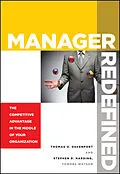In this book the author explains that managers must build human capital and engender employee engagement by managing them almost not at all, by attending instead to the factors and circumstances that make them successful. In other words, managers must play their role from offstage and out of the limelight. Based on a survey of over 16,000 employees, the author presents Towers-Watson' management performance model: Executing tasks, Building relationships and performance capability, and Energizing change. Additionally, managers must create an atmosphere of authenticity and trust.
Autorentext
Thomas O. Davenport is a senior practitioner in the San Francisco office of Towers Watson, a worldwide human resource consulting firm. He provides advice on human capital strategy, employee and organization research, and leadership development to clients in a wide variety of industries.
Stephen D. Harding is a senior practitioner in the London office of Towers Watson. He has consulted in employee research and organizational behavior for the last twenty years and has responsibility for managing employee research projects throughout Europe and elsewhere internationally.
Klappentext
Praise for Manager Redefined
"Davenport and Harding bring a wealth of data and field experience to an often undervalued but pivotal role, the middle manager. They make a convincing case for the untapped potential that lies within that role."212;John W. Boudreau, professor of management, Marshall School of Business; research director, Center for Effective Organizations, University of Southern California
"In a world of constant change, this book will help you make sense of what's important and tackle the challenges of being a manager in impossible times, with experience, wisdom, and research that will redefine your ability to lead. Buy it. Read it. Then do it!"212;Chester Elton, New York Times best-selling author of The Carrot Principle
"The authors provide a blueprint for resolving one of the most important and oftendifficult aspects of management212;motivating performance. Combining research on how companies operate with recent findings in psychology, they redefine managers as coaches who build autonomy and self-efficacy among team members while maintaining account211;ability for company goals." 212;Paul J. Zak, professor of economics and director, Center for Neuroeconomics Studies, Claremont Graduate University
"This is a must-read for anyone interested in understanding the critical role of talent inorganizations. The authors challenge organizations to rethink their perspectives and consider how high-performing managers can become a tangible source of competitive advantage." 212;Alan Miller, chairman and CEO, Universal Health Services
"In their encyclopedic work on how to unleash the power and potential of managers, the authors provide a framework that will also benefit the companies they work for and the employees they lead."212;Patricia O'Connell, management editor, Bloomberg Businessweek
"Manager Redefined makes a very significant contribution by focusing on the crucial but neglected role of managers in sustaining an engaged workforce and provides creative and practical insights on how managers can contribute to organizational success." 212;David MacLeod, coauthor, Engaging for Success, a report to the United Kingdom government
Inhalt
Preface vii
Part I: Context 1
1 Do Managers Matter? 3
A Brief History of Management 4
Defining Management and Leadership 7
The Definition, and the Power, of Engagement 16
Summary 22
2 Why Managers Have a Tough Job 25
Employees Are Smart and Demanding 26
We Have Ambivalent Feelings about Leadership and Followership 29
We Really Don't Like Being Told What to Do 32
Managers Behave Badly 33
Summary 36
3 A New Model of Manager Performance 39
Managers and Competitive Advantage 41
The Manager Performance Model 51
Summary 66
4 Constructing the Manager Role 71
Manager ContributionThe Player-Coach Job 72
Manager CompetencyThe Technical Skill Dilemma 74
The Size of the JobSpan of Control 81
Building the Role System 89
Summary 101
Part II: Implementation 103
5 Executing Tasks 105
Planning Work 106
Clarifying Job Roles 115
Monitoring Progress 137
Summary 139
6 Developing People 143
Acting as a Human Capital Treasurer 144
Providing Direct Development 153
Goal Setting and Performance Feedback 161
Summary 172
7 Delivering the Deal 177
Transforming the Extrinsic into the Intrinsic 178
Individualizing Rewards 181
Boosting Engagement Through Recognition 187
Summary 194
8 Energizing Change 199
Coping with Imposed Change 200
Choosing to Change 213
Sustaining Engagement 218
Summary 225
9 Authenticity and Trust 229
Connecting Authenticity and Trust 229
Building Trust Through Authenticity 232
Implications for Manager Performance 244
Summary 253
10 Fitting the Pieces Together 257
Manager Role Structure and Performance ModelA Summary 258
What Makes a Great Manager? 259
Can a Good Manager Manage Anything? 265
Make Versus Buy 266
Notes for Those Who Want Managers to Succeed 269
Notes 281
The Authors 313
Index 315
